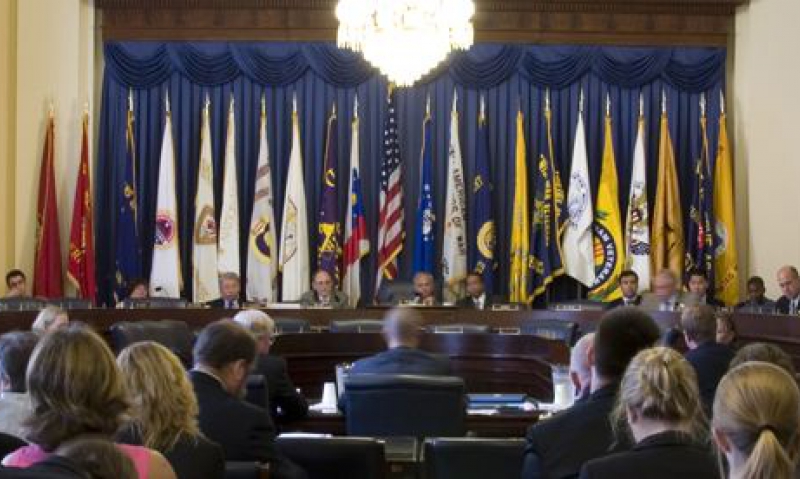
Legion deputy director delivers recommendations for enhanced suicide-prevention efforts for DoD, VA, during congressional subcommittee hearing.
In recent years, the Department of Veterans Affairs has made noticeable efforts to improve its suicide-prevention efforts for America’s veterans. Both VA and the Department of Defense have worked together to improve transition efforts along mental-health lines for U.S. servicemembers.
But testifying before the House Committee on Veterans’ Affairs Subcommittee on Oversight and Investigations earlier this week, an American Legion representative said more can be done – and needs to be done.
Jacob Gadd, deputy director for the Legion’s Veterans Affairs & Rehabilitation Division, said that the number of suicides continues to grow. “The American Legion’s System Worth Saving program – which conducts site visits to VA Medical Center facilities annually – has found several challenges with the delivery of mental health care,” Gadd said in written testimony. “VA has the goal to recruit psychologists from their current nationwide level of 3,000 to 10,000 to meet the demand for mental health services. However, VA medical center facilities have expressed concerns with hiring and retaining quality mental health specialists and have had to rely on fee basis programs to manage their workload.”
While Gadd praised Congress for passing advance appropriations – providing VA with mandatory funding – he said allocating funds from VA Central Office to its Veteran Integrated Service Networks and to the local facilities is still an issue.
“This delay in funding creates challenges for the VA medical center facility in receiving its budget to increase patient care services, hiring or to begin facility construction projects to expand mental health services,” Gadd said. “VA’s 2011 budget provides approximately $5.2 billion for mental health programs, which is an 8.5 percent, or $410 million, increase over fiscal 2010 budget authorization. The American Legion continues to be concerned about mental health funds being specifically used for their intent, and that Congress continue to provide the additional funding needed to meet the growing demand for treatment.”
Others challenges faced in suicide-prevention efforts, Gadd said, include maintaining confidentiality and overcoming the stigma attached to a servicemember or veteran receiving care, the delivery of health care to rural veterans, and an admitted lack of research by VA and DoD, on brain injuries and the difficulties diagnosing post-traumatic stress disorder and traumatic brain injuries, and TBI because of the comorbidity of symptoms between the two.
The Legion has offered itself up to assist VA in its suicide-prevention efforts, Gadd said. At the 2009 National Convention, a resolution was passed that mandated the organization to develop a suicide prevention and outreach referral program. VA’s National Suicide Prevention Coordinator, Dr. Janet Kemp, facilitated an Operation S.A.V.E. Training for members of the Legion’s VA&R Commission; the commission members and other Legionnaires subsequently developed American Legion state, district and post training programs to provide referrals for veterans in distress with VA’s National Suicide Prevention Hotline. The Legion currently has over 60 posts with active suicide prevention and referral programs.
Gadd also reported that in December 2009, the Legion took the lead in creating a suicide prevention assistant volunteer coordinator position, under the auspices of VA’s Voluntary Service Office. Each local suicide prevention office is encouraged to work with veteran service organizations and community organizations to connect veterans with VA’s programs in their time of transition and need. The suicide prevention offices can increase their training of volunteers to distribute literature and facilitate training in order to further reach veterans in the community.
Gadd presented the committee with seven recommendations to improve mental health and suicide-prevention efforts for VA and DoD:
• Congress should exercise oversight on VA and DoD programs to insure maximum efficiency and compliance with Congressional concerns for this important issue.
• Congress should appropriate additional funding for mental health research and to standardize DoD and VA screening, diagnosis and treatment programs.
• DoD and VA should expedite development of a Virtual Lifetime Medical Record for a single interoperable medical record to better track and flag veterans with mental health illnesses.
• Congress should allocate separate mental health funding for VA’s recruitment and retention incentives for behavioral health specialists.
• Establish a suicide prevention coordinator at each military installation and encourage DoD and VA to share best practices in research, screening and treatment protocols between agencies.
• Congress should provide additional funding for telehealth and virtual behavior health programs and providers, and ensure access to these services are available on VA’s Web pages for MyHealthyVet, mental health and duicide prevention, as well as new technologies such as Skype, Apple i-Phone Applications, Facebook and Twitter.
• DoD and VA should develop joint online suicide prevention servicemember and veteran training courses/modules on family;, budget; pre-, during and post-deployment; financial;, TBI; PTSD and depression information.
“It is the position of The American Legion that one suicide is one too many,” Gadd said. “As our servicemembers are deployed across the world to protect and defend our freedoms, we as a nation cannot allow them to not receive the care and treatment they need when they return home. The tragic and ultimate result of failing to take care of our nation’s heroes’ mental health illnesses is suicide.
To read Gadd’s complete testimony, click here.
- Veterans Benefits

